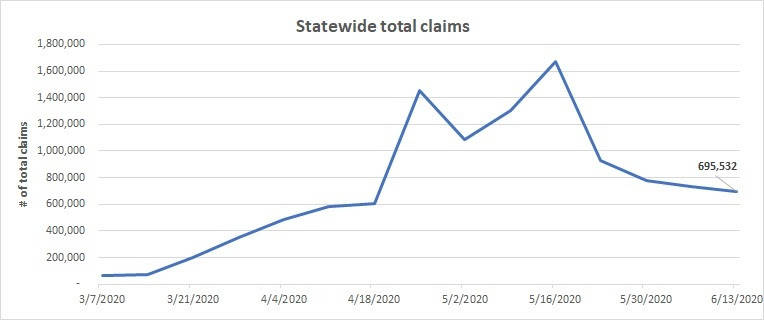Initial unemployment claims declined for a fourth straight week in Kitsap County for the week of June 7 through 13, though numbers remain at about three times what they were in January, before the COVID-19 pandemic began to take root in Washington.
There were 689 new initial claims in Kitsap County in the week of June 7, which is the most recent week with available data. Kitsap has been in Phase 2 of Gov. Jay Inslee’s “Safe Start” program for three weeks now and has applied to move to Phase 3, which should see more businesses reopen and increase capacity in restaurants.
At the state level, there were 29,028 initial regular unemployment claims, down 2.3 percent from the prior week and 695,532 total claims for all unemployment benefit categories, which is a decline of 34,061 from the previous week.
King and Snohomish County saw slight increases while Pierce and Clark Counties recorded fewer initial claims.
“The total number of claims remains historically high, but we are seeing a continued decline in initial claims week over week as the economy reopens,” said ESD Commissioner Suzi LeVine. “As it has been from the outset, our priorities throughout this crisis have been to get benefits as quickly as possible to those who are eligible, and to increase the number of people who are eligible for benefits. We’ll continue to stay focused on these goals even as we navigate the reopening of the economy, and support Washingtonians as they get safely back to work.”
A total of 2,112,219 initial claims have been filed since the week ending March 7, which is when job losses began. Of those claims, 1,320,239 were regular unemployment insurance claims, 421,431 were Pandemic Unemployment Assistance and 367,549 were Pandemic Emergency Unemployment Compensation. A total of 1,180,748 individuals have filed for some type of unemployment benefits and the ESD has paid out over $5.4 billion.
The industries with the highest number of claims this week were manufacturing (3,671 claims, up 58 percent); health care and social assistance (3,583 claims, down seven percent); accommodation and food services (3,240 claims, up two percent); retail trade (2,411 initial regular claims, down five percent); and construction (2,155 claims, down nine percent).


